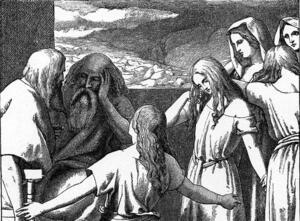Finding the Founding Feminists
Drawing of Zelophehad's daughters, five biblical women who demanded the right to inherit land. From the Metropolitan Museum of Art via Wikimedia Commons.
Every year in July, the story of Pinchas is told. And on July 6, 2013, I was the one telling this story. Yep. Little 13-year-old me, electric green braces and all, was up on the bimah, knees knocking, chanting the story of Pinchas. And I did a great job, if I do say so myself. But as embarrassing as it is to admit now, my understanding of my Torah portion at that time was very superficial. I had spent so much time making sure I knew the words so I didn’t make a fool out of myself when I was chanting, that I didn’t put that much effort into fully understanding what I was saying, and how it affected me.
But as I reexamine this piece of Torah that was at the center of one of the most important events in my Jewish life, I see that this text represents a pivotal moment in terms of establishing women’s rights in biblical times.
It wasn’t until I read Pinchas as a 17-year-old that I saw this story as a feminist one. The portion opens with a man, Pinchas, killing his girlfriend and her lover, and then being rewarded for the deed. She’s the princess of the Midianite people, a people who pose a threat to the Israelites, and G-d saw her murder as an honorable act. Now, you’re probably wondering how on earth a story that begins with a man killing a woman for cheating on him could be a feminist one, but I promise you it is.
G-d then decides that a census needs to be drawn up so that land can be portioned out. The underlying goal being to break up the princess’s people and dilute their ability to go to war with the Israelites. Enter the founding feminists. Five sisters approached Moses and argued that since their father has no sons, they should get his portion of the land. Moses had no idea what to do. So, he talked to G-d, and G-d made a new decree on inheritance: “When a man dies without sons, his daughters shall inherit.” Woohoo! Who knew that there were feminist activists in the 5th century BCE?!
Now, the term “feminism” wasn’t invented until the 1890s, but that doesn’t mean there weren’t feminists before that. These five sisters prove this. When we consider that the Torah was written by men, it’s not surprising that we don’t see many examples of women taking the lead on important issues–like inspiring new laws. So when we do see it, it’s important that we pay attention, and also recognize that there are probably many other similar examples that just didn’t get written down.
This part of the story ends with G-d and Moses looking out on the land they divided, and being proud of what they had done. They probably weren’t proud because they took one of the first steps towards gender equality, a cause we continue to fight for today, but sometimes I like to think that they were.
Prior to studying this text in depth, I had never thought deeply about what it means that the Torah was written by men. Considering this more now, I wonder about all the stories of important women from this time that we don’t even know about because they weren’t recorded.
I can honestly say that I will never read the Torah the same way again. Now I will always wonder what the text isn’t saying, and whose stories aren’t being told. I’m so grateful for these five women who sparked my interest in the consequences of the Torah’s authorship. I’m lucky to have had the opportunity to tell their story at the same time that I came into my own as a Jewish feminist. As such, these women, these founding feminists, are my teachers, my mentors, and my role models.
This piece was written as part of JWA’s Rising Voices Fellowship.








Had wonderful Jewish neighbors as Baptist Sunday School boy.
True but Moshe limits their free choice of husbands to members of their father’s clan.
Your approach will inspire more feminists to look at this male-dominated tradition in new ways.
Love this, Minnah!!